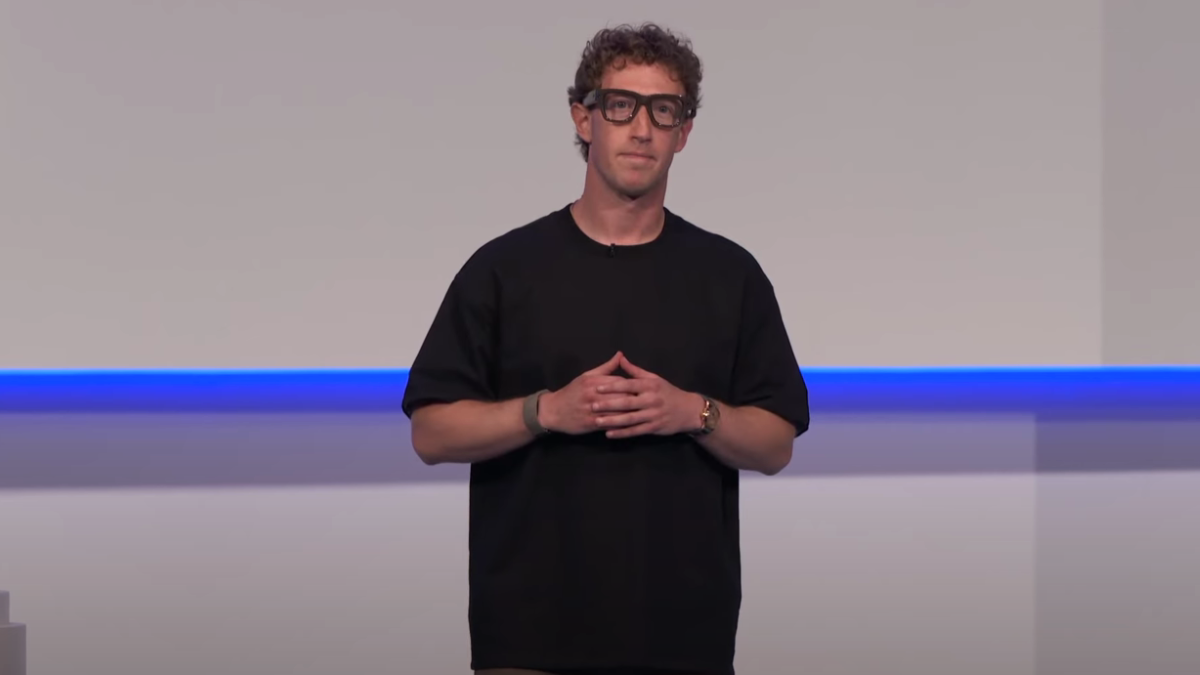At the Meta Connect event last week, CEO Mark Zuckerberg unveiled the first Ray-Ban smart glasses with an in-built augmented reality display.
The new Meta Ray-Ban Display specs, available from 30 September for $799, feature a screen behind the right-eye that can be used to read messages, take videos, follow directions or watch Instagram Reels. AI enables features like real-time subtitles and translation. Paired with Meta’s Neural Band — a wristband that detects subtle hand gestures — users can select, navigate, zoom or adjust volume with small movements of the fingers.
It is the closest product yet to meet Zuckerberg’s vision of smart glasses. He described them as the ideal interface for humans to reach the AI promise of ‘superintelligence’, and his overriding goal is for them to replace the smartphone as the primary way people interact with technology.
That ambition explains why Meta is pouring money into the project. The company is betting heavily on AR glasses. Long frustrated by reliance on Apple and Google’s closed eco-systems, a prominent hardware would be liberating for Meta. Its Reality Labs division, responsible for creating Metaverse software and hardware, lost $8.7 billion in the first half of 2025 and losses are set to grow. Zuckerberg is unapologetic: on a recent podcast he said that wasting ‘a couple of hundred billion dollars’ would be ‘very unfortunate,’ but the bigger risk was ‘not being aggressive enough.’
He isn’t alone in that calculation. Snap has been releasing its Spectacles glasses since 2016 and plans lighter, more immersive models next year. CEO Evan Spiegel has echoed Zuckerberg’s view, arguing that today’s devices are ‘woefully inadequate’ to realise AI’s potential. Even Apple — with less obvious incentive to undermine smartphone dominance — is reportedly pursuing its own AR glasses, with Bloomberg’s Mark Gurman claiming Tim Cook is ‘hell bent’ on beating Meta to launch within the next two years.
The appeal is obvious. For tech leaders it’s not about user experience but the economic prize. If AR glasses ever do become mainstream, the marketing potential would be unprecedented, with every shop window potentially an interactive portal.
Early reviews for Meta’s flagship launch have been warm. Tech cheerleaders hailed the announcement as a new era but even sober voices have been impressed, with The Verge’s Victoria Song calling the glasses ‘the first time I’ve ever felt like consumer smart glasses might really take off’ because she could imagine using them in her daily life.
But it’s important for coverage to stay grounded. At $799, the glasses are priced like a primary device, yet still depend on connection to a smartphone to function. Battery life is limited to around six hours and the market remains tiny. Meta has sold about two million of its cheaper camera-only Ray-Ban models since 2023, while overall smartphone sales hit nearly 300 million units in the second quarter of this year alone, according to the International Data Corporation.
The launch presentation itself didn’t exactly inspire confidence either. Despite Zuckerberg’s attempts to recreate the drama of the original iPhone reveal, technical glitches led The New York Times to describe his performance as leading to more ‘snickers than applause.’ That reflects a broader problem: Meta has never managed a successful home-grown hardware launch. The Metaverse is the obvious cautionary tale, but other products — from the proficient but unpopular Portal, to its misguided TikTok-clone Lasso — underline a track record of costly failures.
Even if Meta gets the tech right, social hurdles remain. The glasses still carry an undeniable dork factor. They are slim by smart-glasses standards but still too chunky to be fashionable. Engineers continue to struggle to shrink batteries and displays enough to make them wearable all day, while still powerful enough to run advanced AI features.
And then there’s privacy. Harvard researchers last year demonstrated how easily glasses paired with facial recognition could access personal information about strangers. On social media, incidents of alleged covert recording — from a TikTok pickup artist accused of filming women at the beach to a beautician wearing them during a Brazilian wax — have only deepened the perception that these devices are creepy.
Meta has tried to address such concerns by ensuring a LED light indicator is active during film (though it didn’t take long for this author to find a YouTube tutorial on how to turn this off). But the privacy concerns are not going away, and analyst Ian Whittaker argues that ‘persuading the general population that smart glasses are not an intrusive device and making them feel “ordinary” may be the biggest challenge’.
In the near term, the tech will likely find their place in specialised contexts — from sports to policing to the workplace. Reports that Amazon is developing specs for delivery drivers hint at this more industrial future. And even on the consumer side, rivals like Apple are showing that AI features, such as instant translation, can be delivered through existing devices like AirPods without the baggage of glasses.
For now, then, the smartphone remains unchallenged. Meta’s new Ray-Bans are clever and in some cases genuinely useful, but they don’t solve the fashion, privacy and trust barriers that stand in the way of ubiquity. As impressive as the technology may be, the dream of AR glasses replacing smartphones looks less like inevitability and more like marketing spin.
Main image taken from Meta’s YouTube channel. You can watch the full Meta Connect 2025 Keynote here.






























